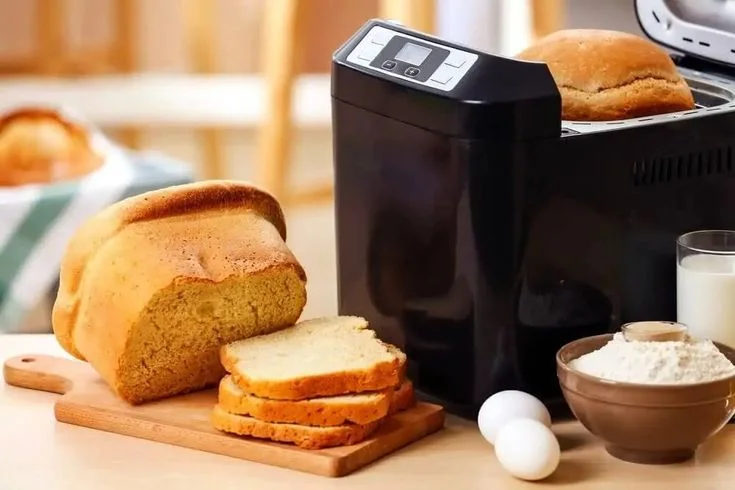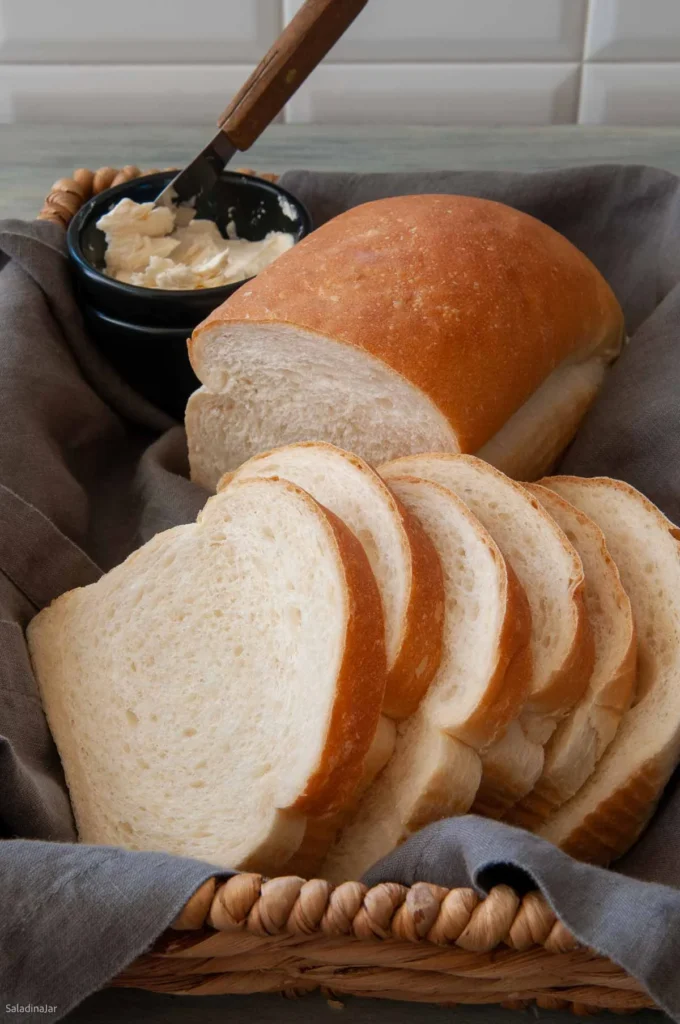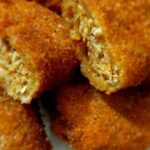If you’ve ever caught a whiff of freshly baked bread and found yourself transported to a cozy kitchen, then you know the power of homemade loaves. And with West Bend bread maker recipes, you can bring that warm, comforting aroma right into your own home.
But it’s not just about the smell – these recipes are designed to deliver delicious, perfectly baked bread every time. From classic white bread to gluten-free options, there’s a recipe for every palate.
So, whether you’re a seasoned baker or just starting out, get ready to elevate your bread-making game with these mouthwatering recipes.
Contents
- 1 Key Takeaways
- 2 Classic White Bread Recipe
- 3 Whole Wheat Bread Recipe
- 4 Cinnamon Raisin Bread Recipe
- 5 West Bend Bread Maker Recipes
- 6 Gluten-Free Bread Recipe
- 7 Artisan Sourdough Bread Recipe
- 8 Sweet Potato Bread Recipe
- 9 Nutrional Facts
- 10 Frequently Asked Questions
- 10.1 Can I Use the Gluten-Free Bread Recipe in the West Bend Bread Maker?
- 10.2 How Can I Adjust the Recipes to Make a Smaller or Larger Loaf of Bread?
- 10.3 What Are Some Suggested Variations or Additions to the Classic White Bread Recipe?
- 10.4 Can I Substitute Different Types of Flour in the Whole Wheat Bread Recipe?
- 10.5 Are There Any Tips for Achieving a Crispy Crust on the Artisan Sourdough Bread Recipe?
- 11 Conclusion
Key Takeaways
- The West Bend bread maker simplifies the bread-making process and saves time and effort.
- Homemade bread allows for customization of flavors and textures, and avoids additives found in store-bought options.
- Experimentation with different recipes and variations is made easy with the West Bend bread maker.
- Enjoy the convenience of fresh, homemade bread whenever desired, with control over the ingredients and settings.
Classic White Bread Recipe
Get ready to bake a delicious loaf of classic white bread with this simple and foolproof recipe. Classic white bread is a staple in many households, and with this recipe, you can create a loaf that’s soft, fluffy, and perfect for sandwiches or toast.
To make classic white bread, you’ll need basic ingredients such as flour, yeast, sugar, salt, water, and butter. The variations of classic white bread are endless, and you can experiment with adding different flavors and textures. From adding herbs and spices to incorporating seeds or nuts, you can customize your bread to suit your taste.
If you encounter any issues while making classic white bread, troubleshooting is essential. One common problem is the bread not rising properly. This can be due to expired yeast or incorrect water temperature. Always check the yeast’s expiration date and make sure the water is warm but not too hot.
Another issue might be a dense and heavy loaf. This could be caused by using too much flour or not kneading the dough enough. Ensure you measure the flour accurately and knead the dough until it’s smooth and elastic.
Now that you have the recipe and troubleshooting tips, it’s time to roll up your sleeves and start baking your own classic white bread. Enjoy the freedom of creating delicious homemade bread that your family will love.
Whole Wheat Bread Recipe
Ready to discover the nutritional benefits and secrets to baking the perfect whole wheat bread? Look no further!
In this section, we’ll explore the health advantages of whole wheat bread and share some expert tips to ensure your loaf turns out irresistibly delicious every time.
Nutritional Benefits of Whole Wheat Bread
Indulge in the delectable and nutritious world of whole wheat bread, an irresistible treat that nourishes your body and delights your taste buds.
Whole wheat bread isn’t only delicious, but it also offers an array of health benefits. Packed with fiber, vitamins, and minerals, this bread is a nutritious choice for any meal. The high fiber content aids in digestion, promotes heart health, and helps to maintain a healthy weight.
Whole wheat bread is also a great source of complex carbohydrates, providing you with sustained energy throughout the day.
When it comes to baking techniques, whole wheat bread requires a slightly different approach than white bread. The unique nutty flavor and dense texture of whole wheat bread can be achieved by using whole wheat flour and adjusting the liquid content accordingly.
Tips for Achieving the Perfect Whole Wheat Loaf
To achieve the perfect whole wheat loaf, try incorporating these helpful tips into your bread-making process. Whole wheat bread is not only delicious but also packed with nutrients. However, it can be a bit tricky to get that perfect texture and rise. Here are some tips to help you along the way:
| Whole Wheat Bread Alternatives | Bread Making Troubleshooting Tips |
|---|---|
| Use a combination of whole wheat flour and all-purpose flour to achieve a lighter texture. | If your dough is too dry, add a little more liquid. If it’s too sticky, add a little more flour. |
| Add some honey or molasses to enhance the flavor of your whole wheat bread. | If your bread is not rising properly, check the yeast and make sure it’s fresh. |
| Incorporate some seeds or nuts for added crunch and nutrition. | If your bread is too dense, try increasing the amount of yeast or letting it rise for longer. |
| Experiment with different whole wheat flour brands to find the one that works best for you. | If your bread is browning too quickly, cover it with foil during baking. |
| Don’t be afraid to play around with flavors by adding spices, herbs, or even grated cheese. | If your bread is not cooked through, lower the oven temperature and bake for a little longer. |
With these tips in mind, you’ll be well on your way to baking the perfect whole wheat loaf every time. Happy bread-making!
Cinnamon Raisin Bread Recipe
Are you ready to fill your kitchen with the delicious aroma of freshly baked cinnamon raisin bread?
Let’s dive into the three key points that will guide you through this delightful recipe.
First, gather the ingredients needed, including cinnamon, raisins, and of course, your West Bend Bread Maker.
Next, follow the simple mixing and kneading process to create a dough that’s soft and perfectly infused with cinnamon and raisins.
Lastly, discover some baking and serving tips to ensure your cinnamon raisin bread turns out moist, flavorful, and ready to be enjoyed.
Get ready to impress your family and friends with this mouthwatering treat!
West Bend Bread Maker Recipes
Course: Baking (Bread)Cuisine: Varies (Dependent on Bread Type)Difficulty: Easy4
30
minutes2
hours180
kcalThe West Bend Bread Maker Recipes offer a convenient way to bake delicious bread at home. With the simple operation of the bread maker, you can create various types of bread, from classic white loaves to hearty whole grain options. Just add the ingredients, select your desired settings, and let the machine do the work. Enjoy fresh, homemade bread with ease!
Ingredients
Flour
Sugar
Yeast
Salt
Directions
- Add ingredients to bread maker pan according to recipe.
- Select desired bread type and crust color.
- Start bread maker and wait for the baking cycle to complete.
- Remove baked bread from pan, let cool, and enjoy!
Ingredients Needed
For the delicious Cinnamon Raisin Bread recipe, gather the following ingredients to create a warm and flavorful treat.
You’ll need:
- 1 cup of warm water
- 2 tablespoons of vegetable oil
- 3 tablespoons of honey
- 1 teaspoon of salt
- 3 cups of bread flour
- 2 ½ teaspoons of active dry yeast
- 1 tablespoon of ground cinnamon
- ½ cup of raisins
These simple ingredients will come together to make a bread that’s soft, sweet, and filled with the warm flavors of cinnamon and raisins.
Now, let’s talk about some alternatives you can use if you’re looking to experiment with different flours.
You can try using whole wheat flour for a nuttier taste, or even gluten-free flour if you have dietary restrictions. Just make sure to adjust the liquid measurements accordingly.
Mixing and Kneading Process
Start by combining the warm water, vegetable oil, honey, and salt in a large mixing bowl. Make sure the water is warm, but not too hot, as it can kill the yeast. Stir the mixture until the honey and salt are dissolved.
Now it’s time to add the flour and yeast. Gradually add the flour, about 1 cup at a time, while mixing with a wooden spoon. Keep mixing until the dough starts to come together.
Then, turn the dough out onto a lightly floured surface and knead it for about 10 minutes. Kneading helps develop the gluten in the dough, giving it structure and elasticity. If the dough feels too sticky, you can add a little more flour. On the other hand, if it feels too dry, you can add a little more water. Remember, practice makes perfect when it comes to mixing techniques, so keep experimenting until you find the perfect balance.
Troubleshooting tip: if your dough isn’t rising properly, check the expiration date on your yeast or make sure your water is the right temperature.
Baking and Serving Tips
Now that you’ve mastered the mixing and kneading process for your West Bend Bread Maker recipes, let’s move on to the exciting part – baking and serving tips for a delicious Cinnamon Raisin Bread!
To ensure your bread comes out perfectly every time, here are some baking techniques to keep in mind.
First, make sure to preheat your oven to the recommended temperature. This will help create that golden crust we all love.
Additionally, placing a pan of hot water in the oven while baking will create steam and give your bread a soft and chewy texture.
Now, let’s talk about bread storage tips.
To keep your Cinnamon Raisin Bread fresh and moist, store it in a plastic bag or airtight container at room temperature. Avoid refrigerating your bread, as it can cause it to dry out.
Enjoy your homemade bread, and don’t forget to share it with friends and family!
Gluten-Free Bread Recipe
Enhance your gluten-free baking skills with a mouthwatering bread recipe that will leave you wanting more. Going gluten-free doesn’t mean sacrificing flavor and texture in your bread. With the right recipe and some handy tips, you can create delicious gluten-free bread right in your West Bend bread maker.
When it comes to gluten-free baking, choosing the right alternative flours is essential. Experiment with a combination of flours like rice flour, almond flour, and tapioca flour to achieve the perfect texture and taste. These flours provide a great balance of moisture and structure for your bread.
Another important tip is to add xanthan gum or psyllium husk powder to your gluten-free bread mix. These ingredients act as binding agents, helping to create a chewy and elastic texture similar to traditional bread.
For a flavorful twist, consider adding some extra ingredients to your gluten-free bread. Mix in some dried herbs like rosemary or thyme, or add some nutritional yeast for a cheesy flavor. You can even throw in some chopped nuts or dried fruits for added texture and sweetness.
With these gluten-free baking tips and the convenience of your West Bend bread maker, you can enjoy fresh, homemade gluten-free bread whenever you desire. So go ahead, unleash your creativity and dive into the world of gluten-free bread baking. Your taste buds will thank you.
Artisan Sourdough Bread Recipe
Don’t let your gluten-free baking skills confine you – now it’s time to explore the world of artisan sourdough bread with your West Bend bread maker. With the ability to make delicious and hearty loaves of bread right at home, you can truly experience the freedom of creating your own sourdough masterpieces.
To start your journey into the realm of artisan sourdough bread, you’ll need a sourdough starter. This is a mixture of flour and water that ferments over time, developing the unique flavor and texture that sourdough bread is known for. You can either make your own starter or purchase one from a reputable source. Once you have your starter ready, the possibilities are endless.
There are countless variations of sourdough bread that you can experiment with. From classic country-style loaves to flavorful additions like garlic and herbs, the choice is yours. The West Bend bread maker provides the perfect platform for creating these variations, allowing you to easily mix and knead the dough, as well as control the baking process.
Sweet Potato Bread Recipe
To create a delectable loaf of Sweet Potato Bread using your West Bend bread maker, follow this simple and mouthwatering recipe. Sweet potatoes aren’t only delicious, but they also offer numerous health benefits. Incorporating them into your bread won’t only satisfy your taste buds but also provide you with essential nutrients.
Here’s what you’ll need:
- 1 cup mashed sweet potatoes
- 1 ½ cups warm water
- 2 tablespoons honey
- 2 tablespoons olive oil
- 1 teaspoon salt
- 4 cups bread flour
- 2 ¼ teaspoons active dry yeast
Instructions:
- In your bread maker pan, combine the mashed sweet potatoes, warm water, honey, olive oil, and salt.
- Add the bread flour on top of the wet ingredients, making sure to cover them completely.
- Create a small well in the center of the flour and add the yeast.
- Select the appropriate setting on your bread maker for a 2-pound loaf and start the machine.
- Sit back and let your West Bend bread maker work its magic!
As the bread bakes, the sweet potatoes will infuse their natural sweetness and moisture into the dough, resulting in a soft and flavorful loaf. Enjoy this delicious and nutritious Sweet Potato Bread as a morning toast or as a delightful snack throughout the day. Indulge in the freedom of exploring new flavors and reaping the health benefits of sweet potatoes.
Nutrional Facts
Calories: Around 180 calories
Total Fat: 1g
Saturated Fat: 0.5g
Cholesterol: 10mg
Sodium: Varies depending on ingredients used
Total Carbohydrates: Around 35g
Dietary Fiber: 2g
Sugars: Around 5g
Protein: 5g
Frequently Asked Questions
Can I Use the Gluten-Free Bread Recipe in the West Bend Bread Maker?
Yes, you can use the gluten-free bread recipe in the West Bend bread maker. It’s a great alternative for those with dietary restrictions. If you encounter any issues, don’t worry, there are bread maker troubleshooting tips available. Enjoy your homemade gluten-free bread!
How Can I Adjust the Recipes to Make a Smaller or Larger Loaf of Bread?
To adjust bread maker recipes for a smaller or larger loaf, simply tweak the ingredient amounts accordingly. Reduce or increase the measurements of flour, yeast, water, and other ingredients in proportion to the desired loaf size. Happy baking!
What Are Some Suggested Variations or Additions to the Classic White Bread Recipe?
To add some pizzazz to your classic white bread, try these suggested variations and creative additions. Jazz it up with herbs and spices, throw in some cheese or olives, or go wild with nuts and dried fruits. The possibilities are endless!
Can I Substitute Different Types of Flour in the Whole Wheat Bread Recipe?
Sure, you can totally mix it up and substitute different types of flour in the whole wheat bread recipe! Just be aware that different flours can have different effects on the texture of your bread.
Are There Any Tips for Achieving a Crispy Crust on the Artisan Sourdough Bread Recipe?
To achieve a crispy crust on your artisan sourdough bread, here are a few tips: knead the dough thoroughly to develop gluten, use a high-protein flour like bread flour, and create steam in the oven during baking for that perfect crust. Enjoy the freedom of delicious homemade bread!
Conclusion
In conclusion, the West Bend bread maker recipes offer a wide array of delicious options for every taste bud. Whether you’re craving a classic white bread, a wholesome whole wheat loaf, a sweet and aromatic cinnamon raisin bread, a gluten-free option, or an artisan sourdough masterpiece, this bread maker has got you covered.
And let’s not forget the mouthwatering sweet potato bread, perfect for adding a unique twist to your baking repertoire. With these recipes, you’ll be able to create homemade bread that will leave your family and friends begging for more.
So why wait? Start baking today and experience the joy of homemade goodness.







